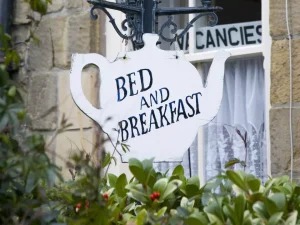A bed and breakfast, or B&B, is a company that accommodates overnight visitors while also providing a breakfast menu. They typically take the form of a large family home with a few rooms. Unlike hotels, B&Bs normally only accommodate visitors for short periods of time, usually overnight, rather than accommodating those looking for a longer stay.
How Do a Bed and Breakfast Work?
Bed and breakfasts provide personalised hospitality services. In most circumstances, the small number of people a host can accommodate helps them to form a greater bond with their visitors. If a visitor has food restrictions, room preferences, or physical limitations, for example, the host can make the required arrangements to make their stay more pleasant. Despite the fact that many bed and breakfasts are handled exclusively by the proprietor, it is not unusual for them to recruit a small staff.
Bed and Breakfast vs Hotel
A bed and breakfast provides a unique experience not found in most hotels, motels, or inns. While certain details may be familiar owing to the nature of the hospitality industry, staying at a B&B is distinct for several reasons. We’ll look at what makes these enterprises different from regular hotels in the sections below:
Atmosphere: The atmosphere is one of the most noticeable distinctions between a bed and breakfast and a hotel. Though a feeling of seclusion is maintained, check-in and breakfast activities are likely to bring hosts and guests closer together. A hotel, on the other hand, is much larger and contains significantly more people, making it harder to make a personal relationship with each visitor.
Amenities: Bed and breakfast facilities include a personal touch that you wouldn’t find at a hotel. Rather than focusing on the grandeur and extravagance that certain hotels strive for, most B&Bs strive to make visitors feel at ease while they are staying with them. Hosts frequently put together gift baskets with local items, accommodate their guests’ interests, and even decorate rooms for special events.
Individuality: A significant distinction between hotels and bed and breakfasts is that each room in a bed and breakfast is often unique. Hotels, whether chained or independently operated, usually have identical layouts and many variations of the same room. Furthermore, most hotels provide a comparable experience, albeit with varying levels of quality. Bed & breakfasts benefit from distinctive service and bedroom layouts because they are virtually usually privately owned and specific to their locality.
Food: Breakfast is one of the fundamental duties of a bed and breakfast, as the name implies. The majority of hotels include a continental breakfast that includes light pastries, fruits, coffee, and tea. Breakfast at a B&B, on the other hand, is usually prepared from scratch and consists of a selection of comfort foods or homestyle breakfast meals.
What Is on a Bed and Breakfast Menu?
A bed and breakfast menu’s contents are determined by a number of criteria, including the host’s tastes, the location of the B&B, and the availability of ingredients. Despite this, most breakfast menus will include a variety of typical breakfast dishes. In certain circumstances, hosts serve breakfast as a sit-down meal during which all guests are encouraged to dine together. Some of the most popular breakfast selections available at the bed and breakfasts are mentioned below:
- Breakfast sandwiches
- Pancakes
- French toast
- Omelets
- Fried chicken and waffles
Bed and Breakfast vs Airbnb
Despite the fact that Airbnb stands for “air bed and breakfast,” there are a few fundamental distinctions between the two. The popular rental business has a wide range of homes and even allows certain customers to book B&B stays through its app, albeit this does not account for the majority of their listings. We’ll look at some of the significant distinctions between bed and breakfasts and Airbnbs in the sections below:
Host availability: A bed and breakfast owner or host is actively involved in practically every element of a guest’s stay. They’ll inquire about the guest’s preferences, meet them at check-in, and do everything they can to make the stay as pleasant as possible. In addition, the host frequently offers breakfast to his or her guests. On the other hand, most Airbnb owners don’t communicate with their guests much beyond check-in and check-out since their duties as an owner don’t necessitate it.
Price: While costs vary, Airbnb accommodations are frequently less expensive than a bed and breakfast. This is due to a number of factors, including the length of the stay, the host’s obligations, and prospective B&B workers.
Hidden fees: When a person arranges a stay on Airbnb, they will almost always find a number of hidden fees added to their final bill. Service costs, cleaning fees, and convenience fees can quickly add up, leading your trip’s ultimate cost to be much more than anticipated. A bed & breakfast’s price usually encompasses the full experience, and it’s reasonable to believe that the listed price is the amount that a guest will pay.
How to Start a Bed and Breakfast
If you want to operate a bed and breakfast, you’ll need to perform a number of jobs and stages in order to be successful. We’ve described some of the most important phases in the process below:
Identify a property: If you don’t already own a home that you want to turn into a bed and breakfast, the first thing you should do is look for one. The size of the house you select is critical to the success of your business. It should be large enough to accommodate numerous guests while maintaining independence, yet small enough to maintain the sense of community that every great B&B has.
Renovate: Make changes to the structure once you’ve identified it to ensure it can house several guests. The amount of work you’ll need to do may vary depending on the state of the structure. Renovations can range from little modifications such as purchasing new furniture and applying a fresh coat of paint to major alterations such as constructing private bathrooms in each room and reorganising portions of the house.
Establish a menu: To complete the bed and breakfast experience, prepare a menu and select a time for breakfast once the property and guest rooms are ready. The food on your daily menu will change depending on your tastes as the host and the people that are staying with you. To differentiate yourself apart from other comparable businesses, create your own distinctive menu.
Consider hiring staff: The number of employees you recruit, if any, is determined by the number of visitors you expect to have at any given moment and the level of responsibility you are willing to assume as a business owner. It’s feasible to handle every activity on your own or with the help of a business partner, but as your guest list grows, this becomes more difficult to manage. To make your B&B work as smoothly as possible, consider hiring a modest number of employees.
List your business: Take the time to market and publicise your bed and breakfast whenever you’re ready to open it. Websites like Airbnb and Vrbo are particularly useful, although they may come with additional costs. To effectively raise awareness of your new business, you may also construct your own website and list print ads.
Anyone working in the hospitality sector should have a basic understanding of what a bed and breakfast is and how to open one. Whether you’re planning to operate your own bed and breakfast or simply want to learn more about the topic, the material provided above is a good place to start. For hotel breakfast supplies, bed supplies, and kitchen equipment supplies, contact A to Z World Hospitality Supplies.







